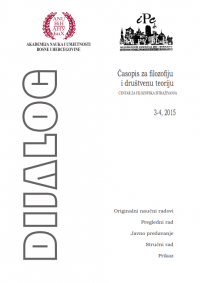Europska unija između apokalipse i utopije
European Union Between Apocalypse and Utopia
Author(s): Mile LasićSubject(s): EU-Accession / EU-DEvelopment, EU-Legislation
Published by: Akademija Nauka i Umjetnosti Bosne i Hercegovine
Keywords: EU at the crossroad; before the dissolution or reform; contradictory scenarios of the future of the EU; pro-European political utopia;
Summary/Abstract: European Union is on crossroad. According to the “White book” of the European Commision there are five scenarios in the game which can be un¬derlined by the need for reforms in the circle of those EU countries that are capable and willing to do deeper integration. Those scenarios implies both “the EU with two speeds” – that is consist of “core of the EU” and their “pe¬riphery”. On the opposite side, however, are the plans of the “Visegrad Group” countries that are advocating the return of the sovereignty to the EU members and lowering the importance of the European decision-making levels, which simultaneously means the acquittal of the EU and the starting of the dissolu-tion. Crude geopolitical games in the world and contradictory internal devel¬opment of the EU also have economic, financial and political aspects as well as value dimensions. Thus, in this new “Cold War” or “post-truth era” of the “fake news”, many of the members of the EU were thinking that EU is not worth of further engagement. That was especially on the mind of the “new” EU countries although they have made huge profits by being a member of the Union. Unfortunately, in the “Western Balkans” countries it had seemed that the alternatives to the future out of the EU is possible in close connection with some other important players on the “big chess board” so, they started to demonstrate repulsiveness against transnational networks in the EU and other kind of diseases such as unfulfilled sovereignty, just like the countries of the “Visegrad Groups” are doing. In this public lecture, the contradictions in the world and within the EU are being deconstructed after which follows the logic which has taken the lead in the so-called the EU’s birthday summit in Rome on March 25, 2017 in an unanimously adopted document called the “Rome Declaration”, which stated that the existing acquis is binding for all but that it is important to seek inclu¬sive reforms that would include and those EU members in the “coalition of the willing” that are leaving the opportunity to join other members to the Union when they are ready for such thing. In these outlines, filled with uncertainties and threats, more thoughtful reform projects are expected, which are expected to be proposed in the form of the “two-speed EU” model, which Juncker, Ma¬cron and Merkel are de facto pledging for as well as explicit and respectable academics like Habermas and others. In this context, public lecture includes and important impulses such as the Manifesto of the Movement for Democra¬tization of Europe (DIEM25) and the European “Political Utopia” presented in the book by Ulrike Beate Guérot “Why Europe must become the Republic”. Certain answers are still to be expected…
Journal: Dijalog - Časopis za filozofiju i društvenu teoriju
- Issue Year: 2015
- Issue No: 03+04
- Page Range: 69-112
- Page Count: 44
- Language: Croatian

